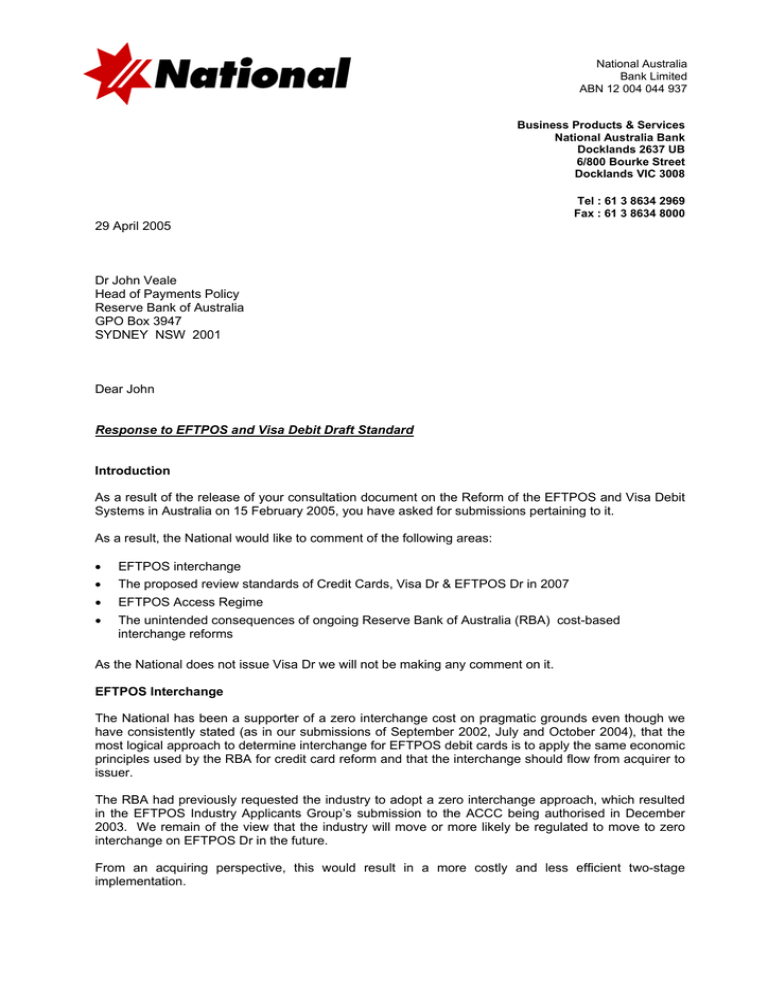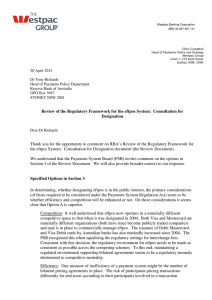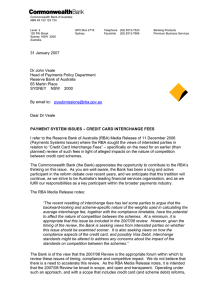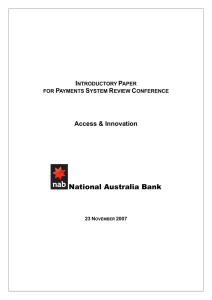Document 10818440
advertisement

National Australia Bank Limited ABN 12 004 044 937 Business Products & Services National Australia Bank Docklands 2637 UB 6/800 Bourke Street Docklands VIC 3008 Tel : 61 3 8634 2969 Fax : 61 3 8634 8000 29 April 2005 Dr John Veale Head of Payments Policy Reserve Bank of Australia GPO Box 3947 SYDNEY NSW 2001 Dear John Response to EFTPOS and Visa Debit Draft Standard Introduction As a result of the release of your consultation document on the Reform of the EFTPOS and Visa Debit Systems in Australia on 15 February 2005, you have asked for submissions pertaining to it. As a result, the National would like to comment of the following areas: • EFTPOS interchange • The proposed review standards of Credit Cards, Visa Dr & EFTPOS Dr in 2007 • EFTPOS Access Regime • The unintended consequences of ongoing Reserve Bank of Australia (RBA) cost-based interchange reforms As the National does not issue Visa Dr we will not be making any comment on it. EFTPOS Interchange The National has been a supporter of a zero interchange cost on pragmatic grounds even though we have consistently stated (as in our submissions of September 2002, July and October 2004), that the most logical approach to determine interchange for EFTPOS debit cards is to apply the same economic principles used by the RBA for credit card reform and that the interchange should flow from acquirer to issuer. The RBA had previously requested the industry to adopt a zero interchange approach, which resulted in the EFTPOS Industry Applicants Group’s submission to the ACCC being authorised in December 2003. We remain of the view that the industry will move or more likely be regulated to move to zero interchange on EFTPOS Dr in the future. From an acquiring perspective, this would result in a more costly and less efficient two-stage implementation. National Australia Bank Limited ABN 12 004 044 937 29 April 2005 Dr John Veale Page 2 The National would have preferred that the RBA adopt a zero-cost interchange standard immediately, rather than a two-step approach, and sees little economic logic to the current approach. Review of Standards of Credit Cards, Visa Dr & EFTPOS Dr in 2007 The most consistent method would be to adopt the same eligible costs for all methods from an issuers perspective. The National believes that these eligible costs should be the cost categories that the RBA has included in their Credit Card Interchange Standard which result in interchange being paid by the acquirer to the issuer. They are the cost of: • the interest free period (which does not apply Visa Dr and EFTPOS Dr); • fraud and fraud prevention; and • transaction processing and authorisation. In addition to these, the cost of operating capital should be included. The RBA has stated previously that this cost should logically have been included, however, owing to the lack of consistent calculation across banks, it was excluded last time. The National has never believed that this was a strong argument for exclusion and with the impending introduction of Basel II it would make sense to include the cost of operating capital in 2007. The National has some concerns that the RBA might consider dropping the cost of the interest free period and replacing it with the cost of operating capital. If the RBA did this, issuers would have to reconsider product pricing and features, including the continued provision of interest free days as part of their credit card product offerings. If this were to occur, there would be significant consumer backlash and merchants would be significantly disadvantaged. We would not favour this approach. EFTPOS Access The National believes that sufficient progress is being made with respect to the EFTPOS access being developed by APCA for the current access providers. The concerns that the RBA has raised are currently being explored. Until these concerns have been worked through, we feel it would be inappropriate for the RBA to issue a draft EFTPOS access regime. The National believes that APCA has until the current Federal Court case challenge to the designation of access has been decided to resolve the RBA’s concerns. This is consistent with the RBA’s own view not to finalise EFTPOS interchange reforms until there is a final decision on the court case. Unintended Consequences of Ongoing RBA Cost-Based Interchange Reforms Potential unintended consequences of the RBA’s cost-based approach to interchange reforms coupled with the regulatory uncertainty that surround them, is likely to lead to a lack of investment in new innovative payment methods and/or the introduction of less efficient non-scheme-based (on-us) payment methods that access consumers transaction accounts. This approach is becoming the norm for assessing new payment initiatives as the threat of the early imposition of inappropriately formed transaction cost-based methods increases risk in the start-up phase. National Australia Bank Limited ABN 12 004 044 937 29 April 2005 Dr John Veale Page 3 Similarly, the real and opportunity costs to established participants in implementing access regimes for fringe players, whose incremental value to the efficiency of payment networks is probably marginal, and who are not prepared to take start up risks themselves, increases the attractiveness ‘on us’ alternatives even where there are evident networks benefits. We query whether this environment is in the long-term interests of the payments system. We are more than happy to discuss these views with you in more depth if you require. Yours sincerely Bruce Munro Executive General Manager (Australia) Business Products & Services



